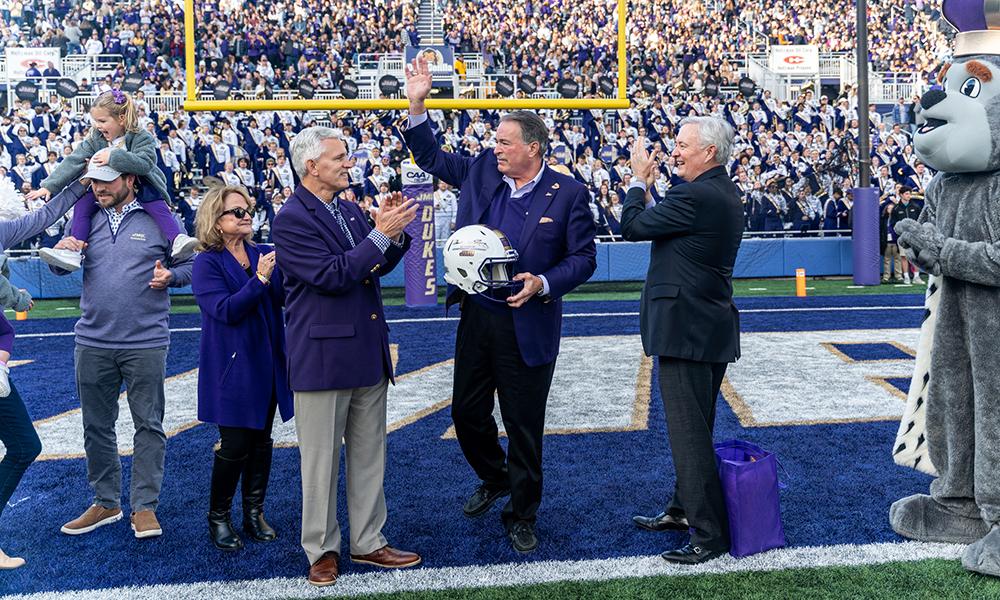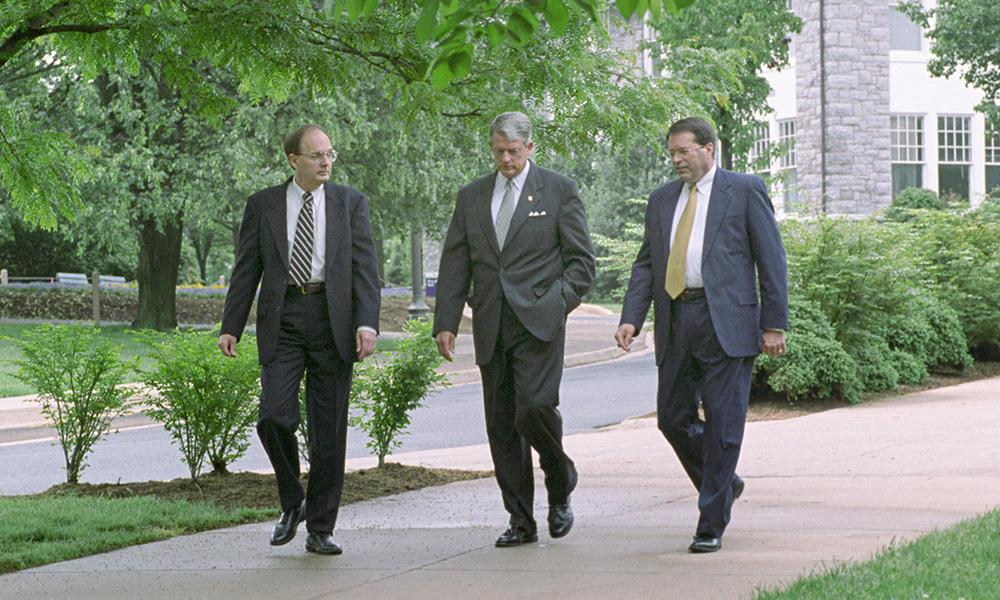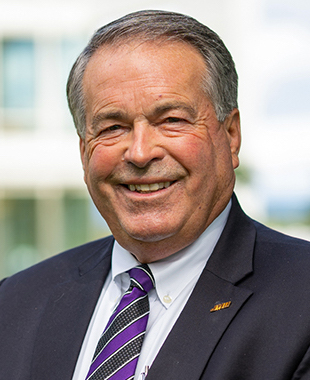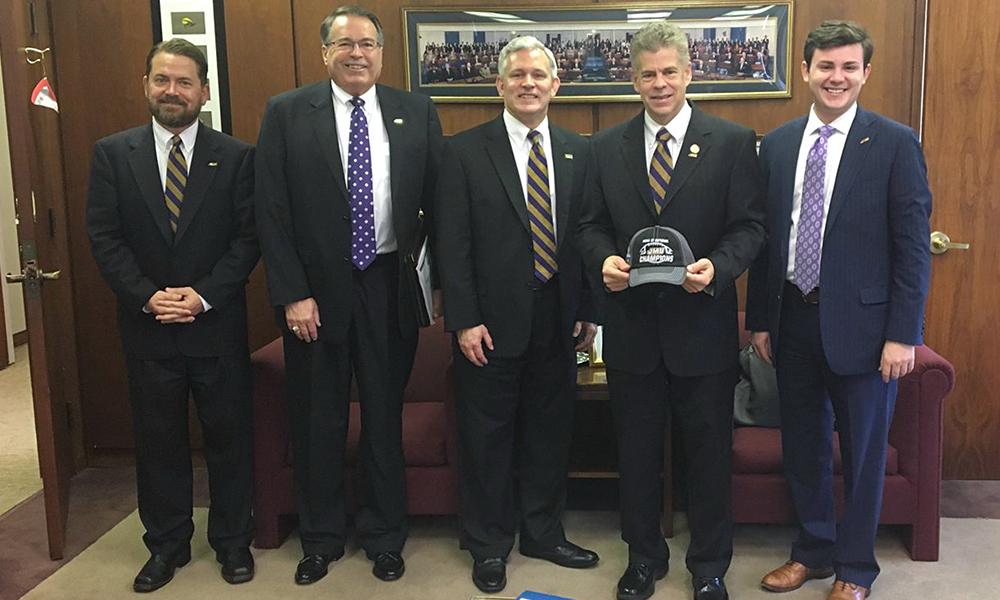The King has left the building
Servant leadership, customer service emphasis define retiring SVP’s career
Featured Stories
SUMMARY: From elevating JMU Athletics to the Football Bowl Subdivision to government relations and many other duties in between, Senior Vice President Charlie King has had a direct hand in JMU’s success, leaving his impact across campus.
By Andy Perrine (’86)
Hired by then-president Ronald E. Carrier in 1995, Charles W. King’s first major capital outlay undertaking at James Madison University was to construct the physical manifestation of Carrier’s academic vision to integrate science and technology in a new college at JMU. Apart from the Convocation Center, this began the university’s giant leap across Interstate 81 and the development of JMU’s bustling East Campus.
No fewer than 48 campus projects later—and after King ran most of the university’s physical operations for 25 years—the JMU Board of Visitors voted in November 2021 to rename the Integrated Science and Technology building as King Hall to honor his retirement in December, a most fitting tribute.

|
After the unanimous vote, which was followed by a sustained standing ovation in the board room, BOV member John Rothenberger (’88) remarked, “If anyone deserves to have a building named for him, it’s Charlie. But, really, way beyond building buildings and running this huge operation that is JMU, Charlie’s biggest impact is cultural. It’s really cultural. Much of the positive experience everyone agrees is the JMU experience comes from Charlie’s leadership.”
JMU, known widely for putting students first and having an unusually close and welcoming atmosphere, has somehow remained so even after nearly doubling in size during the last 25 years. Some believe King deserves a great deal of the credit for such management wizardry.
“People are amazed and talk a lot about how much the university has grown and certainly has changed since our daughter, Tara, arrived on campus in 1995. And Charlie deserves a lot of credit for that,” said Jim Riley (’99P, ’05P), former chair of the JMU Parents Council. “But I think I’d rather talk about what hasn’t changed. Even though there’s new people who have come and many who have left over the years, the relationships have always been wonderful.”
Riley, who has grown close to King over the years, continued, “So when you talk about that JMU spirit not changing after so much change and growth, you have to recognize that it takes tremendous leadership to trickle down through everybody.”
Riley has a point. During JMU’s major growth, King was responsible for running just about everything at the university that was not part of academic affairs and student affairs. This included campus operations, dining services, facilities management, human resources, information technology, budget and finance, intercollegiate athletics and many more units that reported to King as the senior vice president for administration and finance. About the only portion of the physical campus infrastructure that King did not oversee was the residence halls. But even there, the maintenance teams and housekeepers who keep those facilities running reported to King. The housekeepers, especially, provide evidence of King’s influence: Every year, the university receives messages of thanks from parents about how their students were encouraged during Finals Week by their residence hall housekeeper or shown kindness when their student was sick. That sort of “going above and beyond” exemplifies the cultural impact Rothenberger referred to.

|
And that sort of organizational ethos doesn’t just happen—especially in an operation as large as JMU. It must be cultivated. It must be led. At his division’s annual meeting, where the thousands of employees who make JMU’s campus the Most Instagrammed landmark in Virginia by CBS News, King ritually read those thank-you messages from parents aloud and acknowledged the folks responsible in front of their peers. That’s creating culture.
“I guess my north star has always been to look at it from a student’s perspective,” King said. “You know, they’re paying a lot of money. And I worked my way through school. So I’ve always thought it was important for us to make sure they got what they were paying for. My job, and in the role of the area supervisors, was to provide service to everybody else. And so, I worked real hard when I got here to instill that customer service attitude. I’m not saying it wasn’t here already. But I put a focus on it.
“In fact, it was so important to me, that we instituted an annual customer service award that we gave somebody in the division who demonstrated excellent customer service. And I’m real proud today because I hear people all the time talking about customer service. And so, I think it’s worked,” he continued.
Shortly after arriving at JMU, King created the Division of Administration and Finance scholarship to assist the children and relatives of employees within the division to attend JMU. Since its inception, the scholarship has provided $400,000 to employees’ children who might not have been financially able to attend. So it’s no wonder King’s team shows a special loyalty toward him and his leadership.
Another hallmark of King’s run at JMU is that no employee was laid off during economic downturns.

He reflected, “My philosophy was that the academic mission of the university was first and foremost; we had to protect that at all costs. And I think if you go back and look at my tenure here, that’s what we’ve done. And we’ve done it in some very tough times. You know, the Great Recession was the biggest. COVID-19 has been a big test, too. But, you know, we’ve never laid off a person. Nobody’s ever missed a paycheck. We cut some budgets but in a very quick timeframe. We usually put people’s budgets back to where they were or even grew them.”
King’s responsibilities also included running the university’s government relations effort, and his reputation in Richmond as an advocate for efficiency in higher education is well known among legislators. Former House of Delegates Speaker Kirk Cox (’79) released a statement about King shortly after he announced his retirement. “Legislators in Richmond, regardless of party affiliation, will agree that Charlie is a true, level-headed professional. We can rely on Charlie for complete and honest answers to questions we ask. Charlie has always put the university’s best interest first.”
That deep trust and confidence with stakeholders in Richmond is important to the Board of Visitors as well.
“Knowing that Charlie is always careful gives us, on the board, confidence that the priorities he’s taking to our legislators have been thoroughly thought through from the perspective of the taxpayer and that we’re very thoughtful stewards of the commonwealth funds,” said Lara Major (’92, ’20P), BOV rector. From the perspective of tuition payers, Major added, “We’ve obviously been highly focused on keeping our tuition low. And any time we have thought about raising our tuition, Charlie has brought that to us with a viewpoint that is incredibly mindful of the challenges families face with increased tuition prices.”

|
Reflecting on his greatest accomplishments at JMU, King’s modesty is obvious. While overseeing intercollegiate athletics during a time of incredible success across all sports, constructing many capital projects and playing an instrumental role in JMU being ranked often as a best value, it was elevating JMU to join the University of Virginia, Virginia Tech and other Virginia research universities to Level III administrative autonomy which he is proudest of.
“I think there was reluctance to give that opportunity to a comprehensive university like JMU, because it wasn’t one of the research doctoral schools. And so, I’m real proud of the Level III [autonomy], but it was a team effort,” King said. “A lot of people worked on that one.”

